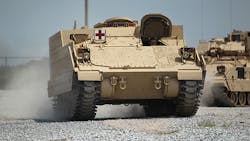US to Accelerate Buying BAE Vehicle for European Deterrence
The U.S. Army’s war-fighting budget request for fiscal 2018 will include funds to accelerate deployment to Europe of its newest combat vehicle, a modern troop carrier built by BAE Systems Plc (IW 1000/157).
Responding to a request from the Army’s European commanders, the service’s Overseas Contingency Operations request will include as much as $254 million to accelerate the purchase of 65 Armored Multi-Purpose Vehicles that had been scheduled to be acquired later. That’s on top of 52 of the vehicles to be purchased in the regular base budget, including 10 to be used in live-fire testing, according to the service.
The Army’s newest vehicles, a replacement for the Vietnam War-era M113, arrives as the service expands the American presence in Europe to counter Russia after it seized Crimea and intervened in Ukraine. The Defense Department and State Department are maintaining a tough line against Russia in Eastern Europe despite questions President Donald Trump raised during last year’s campaign about lifting sanctions against Russia and perhaps recognizing its annexation of Crimea.
Under a plan announced last year, the Army has begun continuously rotating an armored brigade through Europe instead of depending on periodic deployments. That started with the Jan. 8 arrival in Germany of the 4,000-person 3rd Brigade, 4th Infantry Division from Fort Carson in Colorado for a nine-month rotation.
European Reassurance
The first of the new combat vehicles are expected to be deployed as part of the European Reassurance Initiative starting around October 2019, the first quarter of fiscal 2020, service spokeswoman Ashley Givens said in an email. They would be the vanguard of up to 258 of the new, better-armored, more spacious vehicles, according to a service document. The service wants to field two brigades of the vehicles to Europe over four years, Givens said.
The accelerated fielding “recognizes the shortcomings of the M113 in almost every possible way” in terms of protection, commonality with the Bradley Fighting Vehicles it must fight alongside and additional room for soldiers, Major General David Bassett, program executive for ground combat vehicles, said in an interview. Bassett recalled the M113 was removed from the Iraq War because of its inadequate armor protection.
Accelerating deployment for Europe “is just an acknowledgment that whatever acquisition risks exist with some early production” of the new vehicles that are now in prototyping, “it pales in comparison to the operational risk offered by an obsolete, legacy vehicle,” he said.
Pennsylvania Manufacturing Capacity
Because of recent investments, London-based BAE has the capacity at its plant in York, Pa., to meet an accelerated program, according to company spokesman Mike McCarthy. The program is supported by more than 1,000 engineers and employees in Michigan, Minnesota, California and other states, he said in an email.
BAE is designing the Armored Multi-Purpose Vehicle in five versions, including troop transport, medical treatment and mortar carrier. Its only competitor for the contract in 2014, General Dynamics Corp., decided against bidding after saying the competition was unfairly tilted toward its rival, according to a Bloomberg Intelligence assessment.
Contract Overrun
BAE is projected to overrun the initial $383 million development contract that began in December 2014 by as much as 21%, resulting in $463 million in costs, according to the Defense Contract Management Agency. The Army must absorb the overrun because it’s a “cost-type, incentive-fee” type contract.
“We were not surprised that there might be some overrun on that contract, and we’re making the adjustments,” the Army’s Bassett said. But “we are doing our best not to let any of those hiccups effect the schedule,” he said.
Separately, BAE is trying to correct deficiencies with its internal business system for estimating contracting costs, which the Defense Contract Management Agency disapproved in September 2014. The agency as of last month was withholding $22 million in billings until the system is approved.
The company “is committed to continuous improvement, efficiency, and complying with government customer requirements,” McCarthy said. “The Army has reviewed and approved our corrective actions to ensure the Estimating System is re-approved, and we are making good progress in implementing those actions to have this matter resolved within agreed time lines.”
By Tony Capaccio
About the Author
Bloomberg
Licensed content from Bloomberg, copyright 2016.
